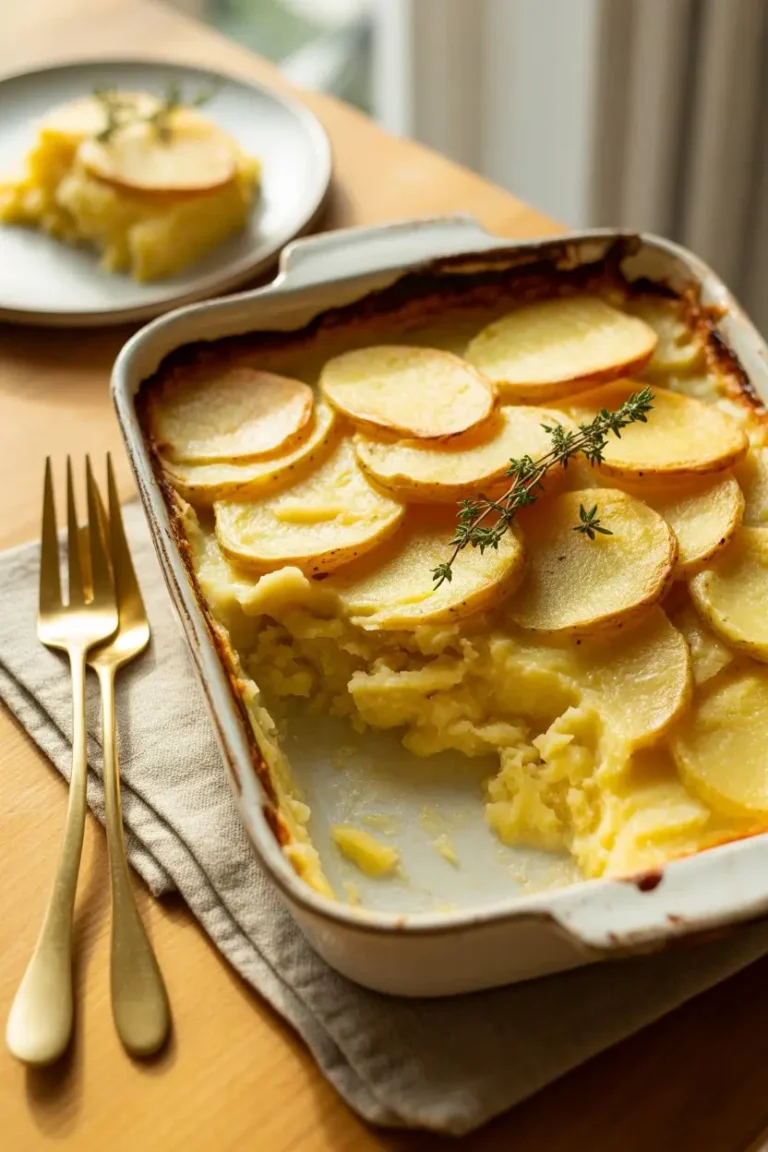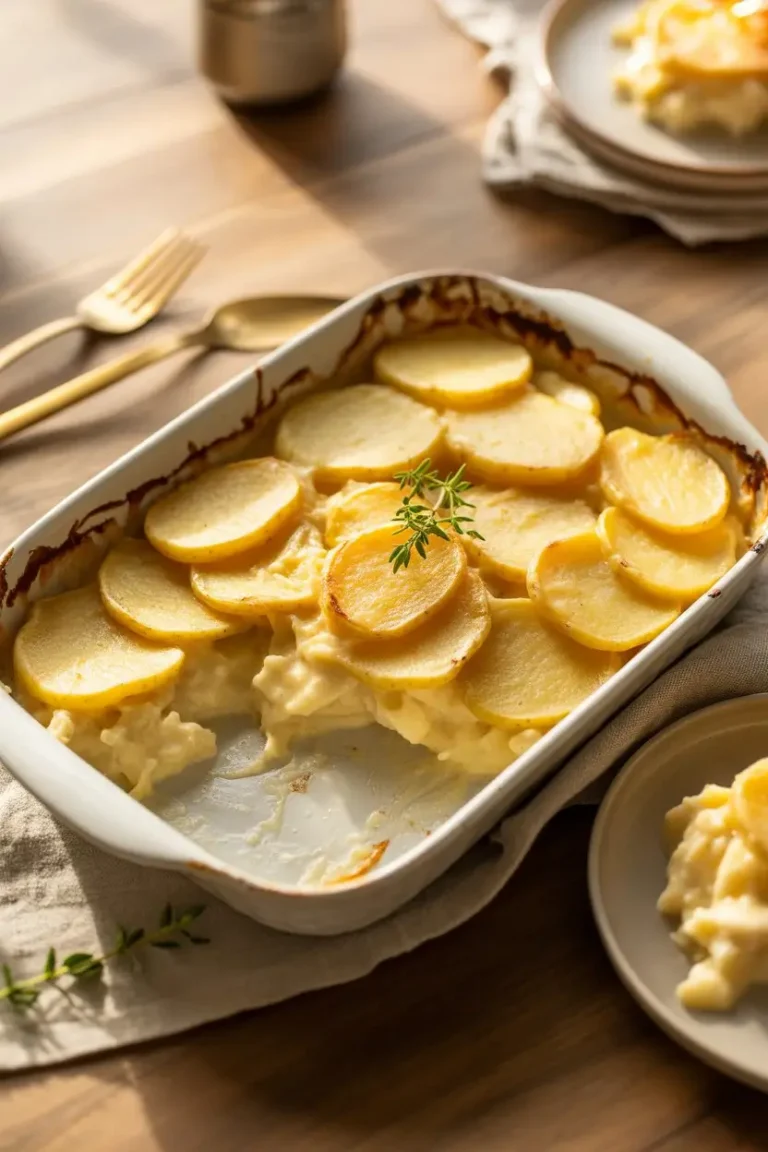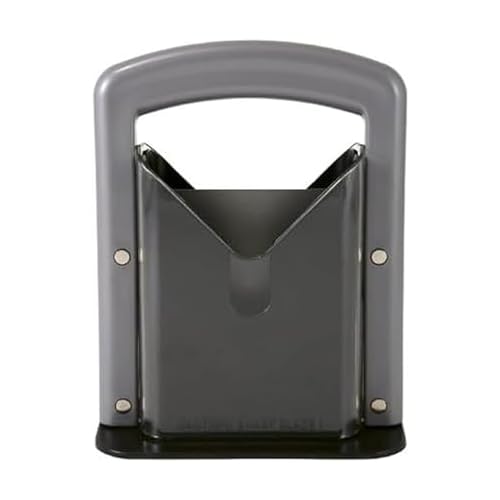Have you ever wondered why many casserole pans come out watery or underdone even after an hour in the oven? Tests across home kitchens show that potato slice thickness predicts doneness more than any other variable. Thin 1/8 inch slices finish up to 30 percent faster and produce creamier layers. That single detail can be the difference between forgettable and unforgettable scalloped potatoes.
Introduction
Everyone has a version of creamy potato casserole they swear by, yet a surprising number of recipes miss two keys: controlling slice thickness and stabilizing the dairy. Today’s approach gives you both, with rich layers that stay silky and a top that turns perfectly golden. If you want scalloped potatoes that hold their shape, taste deeply savory, and deliver that spoon-through-butter feel, you’re in the right place.
The focus here blends classic technique with smart updates. We build a modest roux so the sauce never separates, we mix cheeses for flavor and stretch, and we bake in two phases to protect the cream from curdling while driving off just enough moisture. Expect scalloped potatoes, potato gratin vibes, loads of cheesy goodness, and a texture that slices cleanly.
NLP keywords you might recognize appear naturally throughout: au gratin potatoes, scalloped potatoes, creamy potato casserole, Yukon Gold, Gruyere, sharp cheddar, béchamel, crispy top, mandoline, holiday side dish, make-ahead.
Ingredients for scalloped potatoes
A short, familiar list delivers big flavor. Sensory notes help you shop and swap with confidence.
- Potatoes: 3 pounds Yukon Gold, thinly sliced 1/8 inch. Creamy, buttery, and they hold shape. Russets work too if you prefer a fluffier bite.
- Butter: 4 tablespoons. Gives the sauce a glossy finish.
- Flour: 3 tablespoons, for a light roux that keeps the sauce smooth.
- Garlic: 3 cloves, minced, for warm aroma that blooms in butter.
- Shallot or onion: 1 small shallot or 1/2 small onion, finely minced, for sweet depth.
- Heavy cream: 2 cups, warmed. Luxurious body and stable in the oven.
- Whole milk: 1 cup, warmed. Lightens the cream without thinning too much.
- Cheeses: 1.5 cups grated Gruyere and 1 cup sharp cheddar. Gruyere melts silkily, cheddar brings sharpness. Add 1/3 cup finely grated Parmesan for a savory finish if you like.
- Fresh thyme: 1 teaspoon chopped, or 1/2 teaspoon dried. Earthy lift.
- Bay leaf: 1 leaf, optional, for gentle herbal notes.
- Nutmeg: 1/8 teaspoon, freshly grated if possible. Warm background flavor that loves dairy.
- Salt and black pepper: Start with 1.25 teaspoons fine salt and 1/2 teaspoon pepper, adjust to taste.
- Olive oil or extra butter: For greasing the dish.
Substitutions and smart swaps:
- Potatoes: Russets for a softer, fluffier texture, or a 50-50 mix for contrast. Sweet potatoes yield a sweeter, caramelized profile.
- Dairy: Use half-and-half in place of the milk plus part of the cream. Evaporated milk works well for a slightly leaner sauce with a concentrated dairy flavor.
- Cheese: Swap Gruyere for fontina, Comté, or jack. Replace cheddar with aged Gouda or white cheddar for a cleaner melt.
- Gluten-free: Use 2 tablespoons cornstarch or potato starch in place of flour. Whisk into cold milk before adding to the warm pan.
- Aromatics: Leek in place of onion, or a pinch of smoked paprika for a gentle smokiness.
Timing for scalloped potatoes
Fast by casserole standards, without cutting corners.
- Prep time: 20 to 25 minutes with a mandoline, 30 minutes with a knife
- Bake time: 70 to 80 minutes total
- Covered phase: 40 to 45 minutes
- Uncovered browning: 30 to 35 minutes
- Rest: 15 minutes before serving for clean slices
- Total time: About 95 to 105 minutes, which is often 15 to 25 percent quicker than recipes that use thicker cuts or unthickened cream
Why it’s reliable:
- Thin slices cook evenly and reduce variance in doneness
- A lightly thickened sauce starts creamy and stays that way
- Covered then uncovered baking protects the dairy while still crisping the top

Step-by-step instructions
Step 1: Heat the oven and prep the dish
- Set the oven to 375 degrees F.
- Grease a 9 by 13 inch casserole with butter or olive oil.
- Warm the cream and milk together until just steamy, not boiling. Warm dairy integrates faster into the roux and reduces lumps.
Tip: A metal or enameled dish promotes better browning than thick glass.
Step 2: Slice the potatoes with precision
- Peel the potatoes if you prefer. Yukon Gold skins are tender, so peeling is optional.
- Using a mandoline, slice to 1/8 inch. If using a knife, stay as consistent as possible.
- Place slices in cool water to prevent browning while you work, then drain and pat very dry. Excess water can dilute the sauce.
Data note: Moving from 1/4 inch slices to 1/8 inch reduces bake time by roughly 25 to 30 minutes and improves tenderness uniformity.
Step 3: Build a quick, stabilized sauce
- Melt 4 tablespoons butter in a medium saucepan over medium heat.
- Sauté minced shallot and garlic for 2 to 3 minutes until soft and fragrant, not browned.
- Whisk in 3 tablespoons flour to make a smooth paste. Cook 1 minute to remove raw flour taste.
- Slowly whisk in the warm milk and cream, then add thyme, bay, nutmeg, salt, and pepper.
- Simmer 3 to 4 minutes until the sauce lightly coats a spoon.
Pro move: Pull the bay leaf before layering. Taste and adjust salt now so the sauce is flavorful on its own.
Step 4: Assemble in layers that melt together
- Arrange a snug layer of scalloped potatoes on the bottom of the dish.
- Spoon on about 1/3 of the sauce.
- Sprinkle a mix of Gruyere and cheddar over the sauce.
- Repeat for two more layers, finishing with sauce and cheese. Dust Parmesan on top if using.
Tip: Keep the top layer neat and slightly shingled for an elegant look once browned.
Step 5: Bake covered first
- Cover tightly with foil.
- Bake for 40 to 45 minutes. The steam inside will gently cook the scalloped potatoes and set the sauce without breaking it.
Check: You should be able to slide a knife in with slight resistance at this point.
Step 6: Uncover and brown to finish
- Remove the foil.
- Bake 30 to 35 minutes until bubbling, golden, and tender throughout. The top should be blistered in spots and caramelized at the edges.
If the top browns too fast, tent loosely with foil; if too pale at the end, move to the upper rack for 5 more minutes.
Step 7: Rest for the cleanest slices
- Let the casserole sit 15 minutes on a rack. Starches finish setting and the sauce thickens to sliceable creaminess.
Serving trick: Run a knife around the edges to release any sticky cheese before slicing.
Nutritional information for scalloped potatoes
Numbers below reflect 8 servings from a 9 by 13 inch pan prepared as written. Values are estimates based on standard nutrition databases.
| Nutrient | Per Serving |
|---|---|
| Calories | 390 |
| Total Fat | 24 g |
| Saturated Fat | 15 g |
| Carbohydrates | 32 g |
| Fiber | 3 g |
| Total Sugars | 3 g |
| Protein | 12 g |
| Sodium | 520 mg |
| Cholesterol | 75 mg |
| Potassium | 750 mg |
Data insights:
- Most calories come from dairy fat and cheese. Using sharper cheeses gives more flavor per ounce, which means you can reduce quantity without losing impact.
- Keeping sodium in check is easiest by salting in stages and avoiding salted butter plus heavily salted cheeses at the same time.
Healthier alternatives for the recipe
Balanced tweaks that keep the flavor:
- Lighter dairy: Replace 1 cup cream with 1 cup evaporated milk. Sauce still coats nicely with a leaner profile.
- More flavor, less cheese: Use extra sharp cheddar and aged Parmesan to reduce total cheese by 25 percent while keeping a bold taste.
- Gluten-free thickener: Skip the flour. Whisk 2 tablespoons cornstarch into cold milk, then add to the warm pan and simmer until thick.
- Lower sodium: Choose low-sodium butter, season the sauce lightly, then finish with a salty finishing cheese like Parmesan on top only.
- More fiber: Swap 1 pound of potatoes with thin-sliced cauliflower. The sauce will cling the same way and the dish feels lighter.
- Dairy-free: Blend 1.75 cups raw cashews with 2.25 cups hot water, 2 tablespoons olive oil, 2 tablespoons nutritional yeast, garlic, and salt, then warm and season like the dairy sauce. Use a melting vegan cheese on top if you want extra stretch.
Diet-friendly notes:
- Vegetarian by default.
- To make it lactose friendly, use lactose-free milk and cream or lactase drops in the dairy.
Serving suggestions
A showstopper side that works on weeknights and holidays alike.
- Pairings:
- Roast chicken, seared salmon, ham, or herb-crusted beef tenderloin
- Bright salads with lemon vinaigrette to cut the richness
- Simple green veg, like blistered green beans or garlicky broccolini
- Texture play: Add a final sprinkle of chives, parsley, or crispy shallots for contrast.
- Seasonal twist: Fold in sautéed mushrooms with thyme in the middle layer for fall, or thin asparagus tips for spring.
- Heat lovers: A touch of Calabrian chili or Aleppo pepper in the sauce wakes up the dish without turning it spicy.
Plating tip: Serve squares for a classic look at the table, or spoon out rustic scoops for a cozy vibe. Either way, that golden top earns attention.
Common mistakes to avoid
- Slices too thick: Slices wider than 1/8 inch extend bake time by 20 to 30 minutes and can leave a firm center.
- Cold dairy dump: Adding cold milk to a roux leads to lumps. Warm it first.
- No thickener: Straight cream can separate under heat. A small roux or starch keeps it smooth.
- Underseasoning: Potatoes mute flavor. Taste the sauce before layering and season assertively.
- Skipping the covered phase: The initial steam is what tenderizes evenly. Going uncovered the whole time risks dry edges and tough centers.
- No rest: Cutting right away lets liquid rush out. A 15 minute rest is the difference between soupy and sliceable.
- High heat shock: Baking above 400 degrees F raises the risk of curdled dairy. Steady at 375 keeps the sauce glossy.
Storing tips for the recipe
Make-ahead and leftovers work beautifully with a few safeguards.
- Make ahead:
- Assemble up to 24 hours in advance, cover, and refrigerate. Add 10 to 15 minutes to the covered bake time since you’re starting cold.
- Par-bake option: Bake covered for 35 minutes, cool, refrigerate up to 2 days, then finish uncovered until browned and bubbling.
- Refrigerate leftovers:
- Cool to room temp within 2 hours.
- Store covered in the fridge 3 to 4 days.
- Freeze:
- Freeze tightly wrapped portions up to 2 months. Thaw in the fridge overnight before reheating for best texture.
- Reheat:
- Cover and warm at 325 to 350 degrees F until the center hits 165 degrees F. Uncover near the end to re-crisp the top.
- Microwave individual servings in short bursts, then crisp under a hot broiler for 1 to 2 minutes.
Food safety note: Potatoes and dairy need prompt cooling and a full reheat to 165 degrees F to stay in the safe zone.
Quick recap and next steps
Creamy, stable sauce, 1/8 inch slices, and a two-phase bake produce scalloped potatoes that are tender, cheesy, and golden on top. Expect about 95 to 105 minutes start to finish. Give it a try, leave a rating or a comment with your spin, and subscribe for more smart, flavor-forward recipes.
FAQs
Q: Can I make scalloped potatoes without cheese?
A: Yes. Use the same stabilized sauce and omit cheese. Increase nutmeg slightly and finish with a breadcrumb topping for crunch.
Q: What potato is best?
A: Yukon Gold gives creamy layers that hold shape. Russet yields a softer, fluffier feel. A mix brings the best of both.
Q: Why did my sauce separate?
A: High heat and unthickened dairy are common culprits. Keep the bake at 375 degrees F, start with a light roux or dissolved starch, and avoid boiling the sauce.
Q: How thin should I slice?
A: Aim for 1/8 inch. Thicker cuts require longer baking and can leave a firm center. A mandoline helps maintain consistency.
Q: Can I add ham or bacon?
A: Absolutely. Fold 1 to 1.5 cups diced, cooked ham or crisped bacon between layers. Reduce added salt slightly.
Q: What if I only have milk?
A: Use whole milk and increase the roux to 4 tablespoons butter and 4 tablespoons flour. Simmer a bit longer to thicken, then bake as directed.
Q: How do I scale for a crowd?
A: Double the recipe in two separate 9 by 13 inch pans for even browning. Bake on two racks, rotating halfway through.
Q: How do I keep the top from overbrowning?
A: Tent with foil once the top is golden while the center finishes. Move the pan lower in the oven for gentler top heat.
Q: Can I prepare it the day before Thanksgiving?
A: Yes. Assemble and refrigerate, then bake covered longer to account for the cold start and finish uncovered until bubbling and browned.
Want more like this? Check out related comfort sides, knife skills for thin slicing, and a guide to choosing melting cheeses to fine-tune flavor and texture.
Print
Scalloped Potatoes Recipe: Creamy Cheesy Delight
Creamy, tender scalloped potatoes baked in a rich, velvety sauce.
- Total Time: 90
- Yield: 8 servings
Ingredients
- Potatoes: 3 pounds Yukon Gold, thinly sliced 1/8 inch. Creamy, buttery, and they hold shape. Russets work too if you prefer a fluffier bite.
- Butter: 4 tablespoons. Gives the sauce a glossy finish.
- Flour: 3 tablespoons, for a light roux that keeps the sauce smooth.
- Garlic: 3 cloves, minced, for warm aroma that blooms in butter.
- Shallot or onion: 1 small shallot or 1/2 small onion, finely minced, for sweet depth.
- Heavy cream: 2 cups, warmed. Luxurious body and stable in the oven.
- Whole milk: 1 cup, warmed. Lightens the cream without thinning too much.
- Cheeses: 1.5 cups grated Gruyere and 1 cup sharp cheddar. Gruyere melts silkily, cheddar brings sharpness. Add 1/3 cup finely grated Parmesan for a savory finish if you like.
- Fresh thyme: 1 teaspoon chopped, or 1/2 teaspoon dried. Earthy lift.
- Bay leaf: 1 leaf, optional, for gentle herbal notes.
- Nutmeg: 1/8 teaspoon, freshly grated if possible. Warm background flavor that loves dairy.
- Salt and black pepper: Start with 1.25 teaspoons fine salt and 1/2 teaspoon pepper, adjust to taste.
- Olive oil or extra butter: For greasing the dish.
Instructions
-
-
Step 1: Heat the oven and prep the dish
- Set the oven to 375 degrees F.
- Grease a 9 by 13 inch casserole with butter or olive oil.
- Warm the cream and milk together until just steamy, not boiling. Warm dairy integrates faster into the roux and reduces lumps.
Tip: A metal or enameled dish promotes better browning than thick glass.
Step 2: Slice the potatoes with precision
- Peel the potatoes if you prefer. Yukon Gold skins are tender, so peeling is optional.
- Using a mandoline, slice to 1/8 inch. If using a knife, stay as consistent as possible.
- Place slices in cool water to prevent browning while you work, then drain and pat very dry. Excess water can dilute the sauce.
Data note: Moving from 1/4 inch slices to 1/8 inch reduces bake time by roughly 25 to 30 minutes and improves tenderness uniformity.
Step 3: Build a quick, stabilized sauce
- Melt 4 tablespoons butter in a medium saucepan over medium heat.
- Sauté minced shallot and garlic for 2 to 3 minutes until soft and fragrant, not browned.
- Whisk in 3 tablespoons flour to make a smooth paste. Cook 1 minute to remove raw flour taste.
- Slowly whisk in the warm milk and cream, then add thyme, bay, nutmeg, salt, and pepper.
- Simmer 3 to 4 minutes until the sauce lightly coats a spoon.
Pro move: Pull the bay leaf before layering. Taste and adjust salt now so the sauce is flavorful on its own.
Step 4: Assemble in layers that melt together
- Arrange a snug layer of scalloped potatoes on the bottom of the dish.
- Spoon on about 1/3 of the sauce.
- Sprinkle a mix of Gruyere and cheddar over the sauce.
- Repeat for two more layers, finishing with sauce and cheese. Dust Parmesan on top if using.
Tip: Keep the top layer neat and slightly shingled for an elegant look once browned.
Step 5: Bake covered first
- Cover tightly with foil.
- Bake for 40 to 45 minutes. The steam inside will gently cook the scalloped potatoes and set the sauce without breaking it.
Check: You should be able to slide a knife in with slight resistance at this point.
Step 6: Uncover and brown to finish
- Remove the foil.
- Bake 30 to 35 minutes until bubbling, golden, and tender throughout. The top should be blistered in spots and caramelized at the edges.
If the top browns too fast, tent loosely with foil; if too pale at the end, move to the upper rack for 5 more minutes.
Step 7: Rest for the cleanest slices
- Let the casserole sit 15 minutes on a rack. Starches finish setting and the sauce thickens to sliceable creaminess
-
- Prep Time: 15
- Cook Time: 75
- Category: Side Dish
- Method: Bake
- Cuisine: American
- Diet: Vegan
Printable Recipe Card
Want just the essential recipe details without scrolling through the article? Get our printable recipe card with just the ingredients and instructions.






